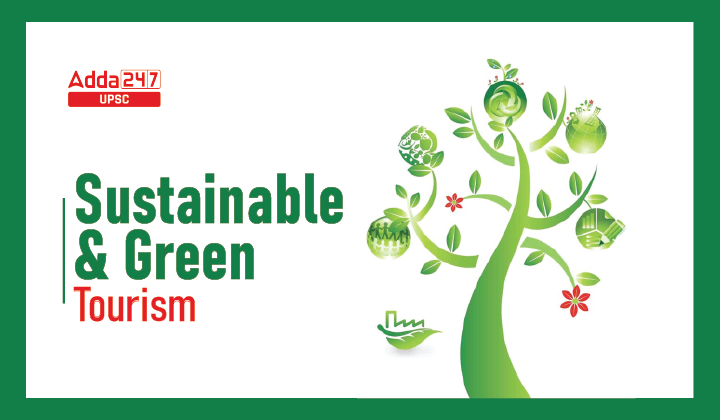Table of Contents
Sustainable and Green Tourism- Relevance for UPSC Exam
General Studies III- Environmental Pollution & Degradation.
In News
- Ministry of Tourism identified Tourism Industry’s potential as a Sunrise Industry.
- There is a need for tourism analysts to hold tourism planners accountable.
What is tourism?
- Tourism is travel for pleasure or business; also the theory and practice of touring, the business of attracting, accommodating, and entertaining tourists, and the business of operating tours.
Types of tourism
- Domestic tourism: Refers to activities of a visitor within their country of residence and outside of their home (e.g. a Indian visiting other parts of India)
- Inbound tourism: Refers to the activities of a visitor from outside of country of residence (e.g. a Spaniard visiting Britain).
- Outbound tourism: Refers to the activities of a resident visitor outside of their country of residence (e.g. an Indian visiting an overseas country).
What does sustainable tourism mean?
- Sustainable tourism is defined by the UN Environment Program and UN World Tourism Organization as “tourism that takes full account of its current and future economic, social and environmental impacts, addressing the needs of visitors, the industry, the environment and host communities.”
What is the main importance of tourism?
- Tourism boosts the revenue of the economy, creates thousands of jobs, develops the infrastructures of a country, and plants a sense of cultural exchange between foreigners and citizens.
The need of Tourism
- Tourism is not a fad. It is a compulsion driven by the urge to discover new places. Because we have this compulsion to venture into the unknown, we need each other. When humans travel, meet and exchange ideas, civilisation flourishes.
What should be done to promote tourism?
- National Tourism Authority: A separate National Tourism Authority (NTA) should be established for executing and operationalizing various tourism related initiatives. Simple, flexible and elegant processes will be laid down to allow for nimbleness.
- National Tourism Advisory Board: A National Tourism Advisory Board (NTAB) should be set up to provide overall vision, guidance and direction to the Development of Tourism Sector in the country.
- Creating Synergy in Tourism Eco System: In order to ensure synergy at various levels of Government and with the Private Sector, it is important to have a well-defined framework in place.
- Quality Tourism Framework: A robust framework for quality certification of products and services across all segments like accommodation providers, tour operators, adventure tour operators, service providers like spa and wellness, guides, restaurants etc. should be laid down.
- Enhancing the existing luxury tourism products: The existing tourism products such as Nilgiri Mountain Railway, Palace on Wheels etc. should be enhanced and their numbers will also be increased. Haulage charges will be rationalised to make luxury trains viable.
- Railways can be a game changer: For tourism Railways have presence in most parts of the country. Most of the tourist destinations in the country are connected by rail. Railways is also in the process of connecting more places especially the strategic locations that also are tourist places with limited connectivity at present. Indian Railways is working towards promoting tourism in the country by operating more trains connecting tourists’ destinations and also by providing an array of products starting from luxury tourist trains to budget catering tourist trains
What is MICE tourism of Gujarat?
- The acronym “MICE” stands for “Meetings, Incentives, Conferences and Exhibitions”, and is essentially a version of business tourism that draws domestic and international tourists to a destination.
- The policy aims to make Gujarat one of the top five MICE tourism destinations in the country.
Way forward
- Enhance the contribution of tourism in Indian economy by increasing the visitation, stay and spend
- Create jobs and entrepreneurial opportunities in tourism sector and ensure supply of skilled work force
- Enhance the competitiveness of tourism sector and attract private sector investment
- Preserve and enhance the cultural and natural resources of the country
- To ensure sustainable, responsible and inclusive development of tourism in the country
Conclusion
- We know that India has the highest tourism potential of any country. That is because we have every terrain and climate zone, and a range of customs, traditions, cuisines, crafts, art forms and festivals unmatched by any other nation. We should monetize our potential through putting comprehensive National tourism policy in place.




 TSPSC Group 1 Question Paper 2024, Downl...
TSPSC Group 1 Question Paper 2024, Downl...
 TSPSC Group 1 Answer key 2024 Out, Downl...
TSPSC Group 1 Answer key 2024 Out, Downl...
 UPSC Prelims 2024 Question Paper, Downlo...
UPSC Prelims 2024 Question Paper, Downlo...





